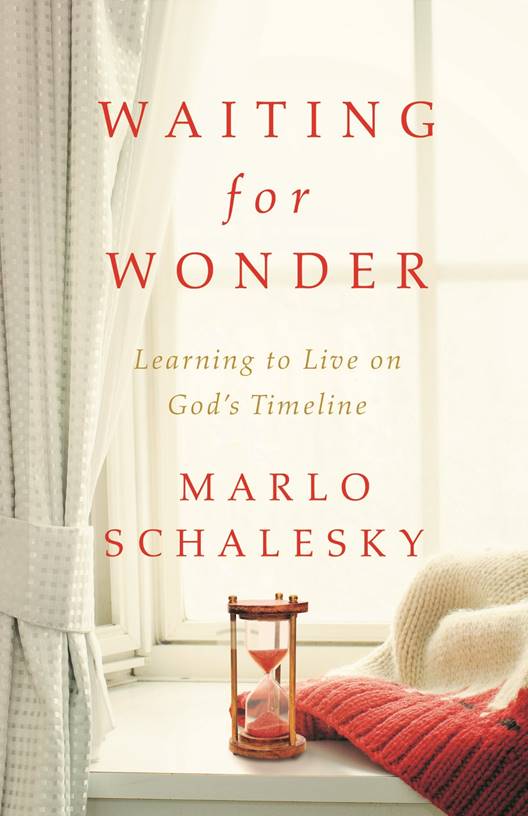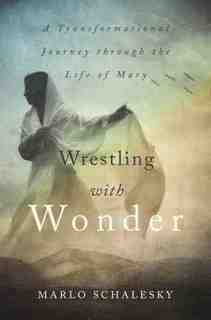 Hi Friends,
Waiting for Wonder
Hi Friends,
Waiting for Wonder is finally available! I hope you'll join me with Sarah, Abraham's wife, on this journey through learning to wait well. A
Leader Guide is also available for groups!
Here's a bit about the book:
YOU’VE NEVER SEEN SARAH, OR HER GOD, LIKE THIS!
Who is this God? Who is he who makes impossible promises, and then asks us to wait? Who is He who shows us the stars in the sky when we don’t see even a glimmer of hope? Who is He when months turn to years and stretch to decades and still we wait? Who is this God of long intervals, painful delays, and yet-unanswered prayer?
It’s easy to believe God when a promise is new, fresh, bubbling with life. It’s hard when the years pass and nothing changes. It’s hard to keep praying, keep hoping, keep believing. It’s hard when those you love betray you, when desperation strikes, when your own plans backfire, and still God does not fill the emptiness. But God is calling us to more. He is calling us, as He called Sarah, to wonder, to laughter in the face of the impossible, to a blessing not just for us but for the whole world.
Come, join Sarah, Abraham’s wife, on a journey of discovery. Walk the long road to Canaan, be rescued from the harem of Pharaoh, hear the promises of God in the wilderness, struggle, fail, and finally believe that nothing, nothing at all, is too difficult for the Lord. Come, wait with Sarah, and find your own journey in hers.
Because God’s timing is so rarely our own...
Because we lose the wonder in the waiting of life ...
Because Sarah shows us God -- Determined, breath-taking, and beyond all our plans...
Here's how I envision it might have been for Sarah when she laughed at God (EXCERPT from Chapter 9):
I
am old. I feel the years deep in my bones. I carry them like stones in my soul.
I look down at wrinkled hands, once smooth. Do they shake, just a little? Then
I close my eyes. I don’t want to see. I don’t want to know. It is too hard to
remember the years gone by, to feel them, to carry them and know that promises
are long past.
So I wait here, wait for nothing. I
wait in the heat of the day when no breeze blows through the leaves of the
great oak. I wait as Abraham sits and rests, an old man at the entrance of our
tent, napping in the slice of shade.
I stay inside, safe from the heat
but not from the years.
We are at Mamre again. And I
remember how my Abraham built an altar to the Lord here so many years ago. An
eternity ago, when our God told him to look up and gaze to the north, south,
east, and west. All the land he saw was to be given to our descendants,
descendants who were to be like the dust of the earth.
As plentiful as dust. And still I
don’t even have a grain of sand. Barren. As always.
I sigh and turn from my thoughts. I
listen to the last of the workers returning to their tents for their afternoon
rest. I watch the dust settle in the air. I watch it and do not weep. The time
for tears is long past. I have shed too many already.
I glance out the tent flap. It is
the very hottest part of the day. Cattle huddle under the shade of the oaks. A
donkey swishes its tail. A camel looks out over the plain toward Sodom. A
beautiful city, an evil one. And for once I am glad for the oaks of Mamre, glad
to be here in the desolation.
I move deeper into the tent. I
have mending to do and preparation for the evening meal. But then
there is a rustle outside. Voices. Abraham’s. And some I
don’t recognize. I go toward the tent flap. Before I can lift it, Abraham
rushes through.
“Hurry! Knead three seahs of the
finest flour and make some baked goods!”
“Three seahs? So much?”
“Yes, we have guests!”
“Are we entertaining an army?” I
peek from the tent. “There are but three. Who are they?”
“I don’t know. But they are not
normal travelers. There’s something . . .
I don’t know, but only the finest for these guests. Please, Sarah.”
He runs back out. Runs! Men of his age
and stature do not run. But Abraham does. And for these strange
men. I know he will find our best calf and have a servant prepare it. He will
add butter and milk. And I will prepare three whole seahs, enough to feast
dozens, fine enough for a king.
I grab what I need. Flour and water,
milk, and a touch of butter. I knead the
bread, my fingers sinking deep in the dough. I knead, I bake, and I wonder.
Who are these men who have come to
the great oaks of Mamre, to the place where my husband built an altar and
sacrificed to our God?
I bake the bread quickly. Abraham
serves it.
I will not go out. I cannot. I dare
not. So I hide here in my tent, in the shadows, away from the light of day,
from the eyes of men who look like travelers but could be more. I hide from
them. I hide from hope.
I hear a man’s voice, deep,
resonant. “Where’s your wife Sarah?” He calls me by my new name, my true name,
this man who has not seen me.
Abraham answers,
“Right here in the tent.”
I peek out, just barely. The men still
have their backs to me. Abraham is motioning toward me. I shake my
head. I do not move. I cannot. I dare not. The shadows are my cloak. I pull
them tighter around me.
Then one of the men speaks again. He
speaks with authority and confidence. He speaks to my soul, and my heart
breaks. “I will definitely return to you about this time next year,” he states.
“Then your wife Sarah will have a son!”
A laugh bubbles within me. A son? At
my age? I’m no longer able to have children and my husband’s old! I glance at
my wrinkled hands. They are shaking now, with
age and disbelief, with pain and the bitterness of too many years of
disappointment. A son? The laugh threatens to spill out. I swallow it. I keep
it to myself, bury it in my heart. I laugh within.
And the man speaks again. The one in
the middle. “Why did Sarah laugh and say, ‘Me give birth? At my age?’” He
pauses, the question heavy in the air.
How did he know? I am behind him. I
am hidden. The shadows are my garment. I shrink from the light. He does not see
me. He cannot. Can he?
Who is this man who sees into my
soul?
His next words pierce me, undo me.
“Is anything too difficult for the Lord? When I return to you about this time
next year, Sarah will have a son.”
The Lord? The Lord is here. He sees
me. He knows me. And I have laughed at the promise of El Shaddai.
Now my hands truly shake. Now I know
fear. And maybe, perhaps, a hint of hope.
Words slip from my lips. The only
ones I speak. Quiet words. Foolish words. “I didn’t laugh.” A lie.
He does not turn as he speaks again.
He doesn’t look, but I know he sees. I know he hears. “No, you laughed.” The
truth, bold and unadorned. It swallows up my lie and leaves nothing but truth,
nothing but hope, in its place. No shame. No condemnation. Just the truth.
The impossible truth.
I cannot hide in shadows. I cannot
hide in lies. I dare not hide from this one who
sees me. I thought to serve here in the tent, unknown and uncalled.
But he has called me. He has seen
me. He has heard the silent laugh of my soul. Is anything too difficult for El
Shaddai?
Do I dare believe?
Do I dare hope again?
 Hi Friends,
Hi Friends, Can you imagine that? We writhe with impatience and
frustration and the pain of waiting, but the purpose isn’t punishment at all. It's not even just a lesson in perseverance. The true purpose of the long wait is to produce joy! Real, true, lasting joy in you and in me!
Can you imagine that? We writhe with impatience and
frustration and the pain of waiting, but the purpose isn’t punishment at all. It's not even just a lesson in perseverance. The true purpose of the long wait is to produce joy! Real, true, lasting joy in you and in me!









